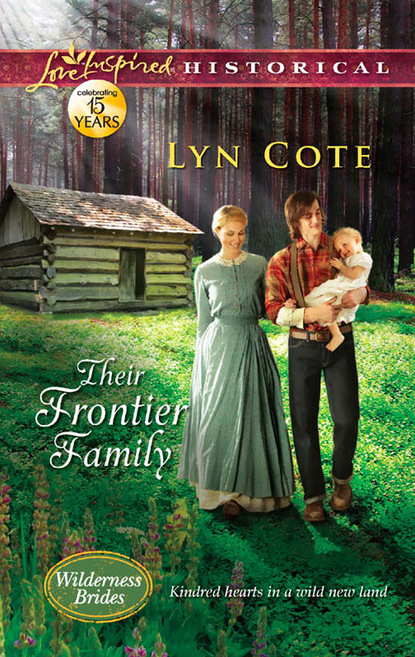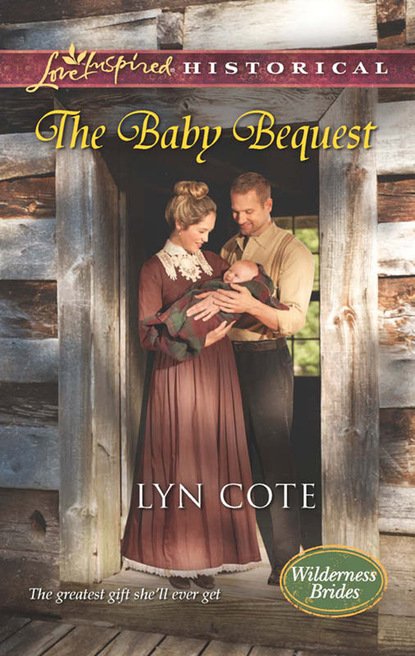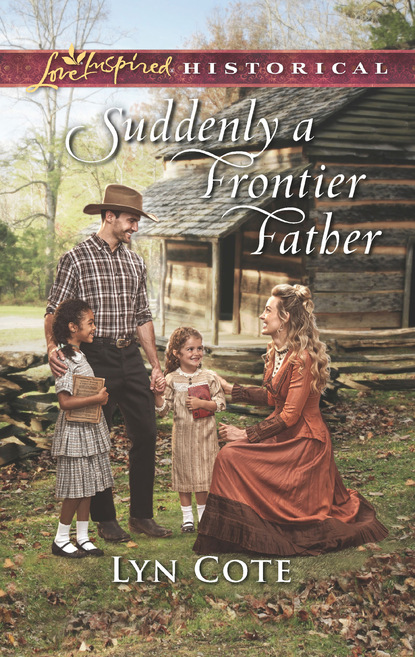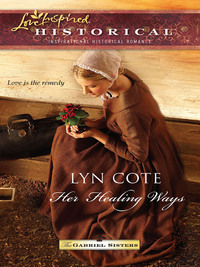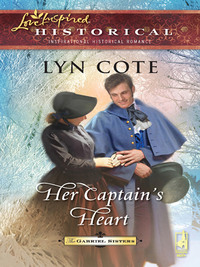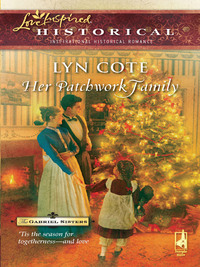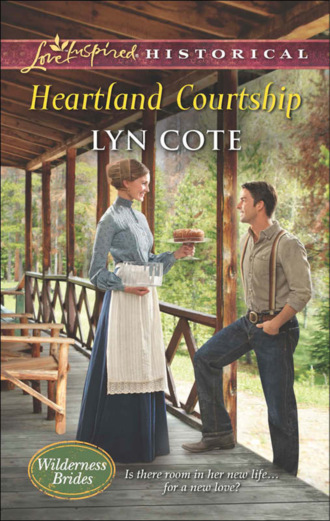
Полная версия
Heartland Courtship
“Brennan Merriday,” the little Quaker scolded, “what was thee thinking?”
“Why do you always use both my names?” he snapped, breathing hard too and saying the first thing that came to mind that didn’t smack of rudeness.
“That is the Quaker way, our plain speech. Titles such as mister and sir are used to give distinction, and all are equal before God.”
She lay beside him, her arm lodged under his chest, much too close to suit him.
“God and Quakers may think that but hardly anybody else does,” he panted. He rolled away to stand but halted when he’d gained his knees. He had to get his breath before trying to stand to his feet, get away from this soft, sweet-smelling woman.
The Quaker sprang up with—he grumbled silently—a disgusting show of energy. “I’ll help thee.”
“I prefer to get up by my lonesome, thank you,” he retorted, his temper at his own weakness leaking out. He glanced at her from the corner of his eye.
Her hair had come loose from a single braid and flared around her shoulders. Her skin glowed like a ripe peach in the dawn light. He took a deep breath and tried to turn his thoughts from her womanliness.
“Why did thee do this without discussing it first, Brennan Merriday?”
“I reckon,” he drawled, “I overestimated my strength, Miss Rachel.”
“I don’t think thee understands just how ill...” She pursed her lips. “A little patience is what is needed now. I had planned to help thee take a short walk today. It is exactly what is needed.”
“Well, I saved you the trouble and took my own walk.” He couldn’t stop the ridiculous words.
She gave him a look that mimicked ones his sour aunt Martha had used often when he was little.
“I’m not a child,” he muttered.
A moment of silence. Miss Rachel pressed her lips together, staring at him. Then she glanced away. “I know that,” she murmured.
Slowly he made it onto one foot and then he rose, woozy but standing.
She waited nearby, both arms outstretched as if to catch him. “Should I call Noah to help?”
“I can do it myself. Just let me take my time.”
The family dog stayed nearby, watching as if trying to figure out what they were doing.
“You can go on in,” he said, waving one hand.
She studied him. “Very well, but since thee has so much energy, thee can help me today. I am going to try a new recipe and I need the walnuts I bought in Saint Louis shelled and chopped.”
“I’ll look forward to it, Miss Rachel,” he said with a sardonic twist and bow of his head.
She walked away and he had to close his eyes in order not to watch her womanly sway. Even a shapeless housecoat couldn’t completely hide her feminine curves. Why hadn’t some man in Pennsylvania married her? She wasn’t ugly or anything. And why was he, Brennan Merriday, drifter, thinking such thoughts?
He was the last one to speak about getting married. His wife had betrayed him, but perhaps from her point of view he’d betrayed her. Either way, Lorena was dead and he had no business wondering why someone was or wasn’t married.
* * *
After breakfast, Noah went outside to work on some wood project. Brennan watched him leave, wishing he had the strength to do man’s work. The pretty wife and children were off to visit friends and that left him alone with the spinster.
Miss Rachel began setting out bowls, eggs, flour, sugar and such. “I am baking rolled walnut yeast logs today. I recalled that it’s one of Noah’s favorites and I want to thank him for his kindness to me.”
Her remark caught Brennan’s attention. So she felt beholden to the Whitmores, too? And then he recalled that she had said she’d arrived on the same riverboat as he had. “What’d you come here for? To find a husband?”
If looks could slap, his face would have been stinging.
“No, I am not looking for a husband. I could have had one back in Pennsylvania. That is, if I didn’t mind being a workhorse, raising six stepchildren under the age of twelve.” Her tone was uncharacteristically biting.
She reddened. “I didn’t resent the children, honestly, but if I’d felt any love for their father...or sensed that he might ever...” Her jaw tensed. “I like to do business but marriage should be a matter of the heart, not something akin to a business contract. Doesn’t thee agree?”
A matter of the heart. His jaw clenched and his unruly mind brought up Lorena’s face. Miss Rachel wanted to be loved, not just needed. And he’d found out that his beloved one could let him down, turn her back and walk away.
Wrenching his mind back to the present, he held up both hands. “I get it. I ain’t looking for a wife.”
“That suits me.” She lifted her chin. “I’ve come to set up in business here.”
He couldn’t mask his shock. “You plan to have your own business?”
“I intend to open a bakery and sweet shop. And Pepin is just the kind of town that can support one.”
“Are you out of your mind?” he blurted. “A bakery in this little half-horse town?”
“No,” she said, dismissing his opinion. “I am not out of my mind. Pepin’s a river town. Boats stop daily, dropping off and picking up passengers and goods. I will sell my confections to the river boatmen and passengers. Candies and baked goods. I’ve rarely met a man without a sweet tooth.”
He glanced directly at her for the first time. “You good at makin’ candy and such?”
He glimpsed a flash of pleased pride in her eyes. “People have said I have a gift for creating sweet things.”
“Well, when am I gonna taste some?” he asked with a sly glance.
He’d made her smile. “Well, if you start shelling these walnuts, that would be today.”
She set a cloth bag of nuts, a small hammer and a slender, pointed nutpick in front of him. “Take thy time. I must mix the dough and it must rise once before I’ll need to roll it out, then spread the filling of honey, cinnamon and crushed walnuts and roll it back up to rise again.”
He usually spent his days sweeping out liveries or saloons or lifting and carrying at docks. It had been a very long time since he’d sat in a kitchen with a woman while she baked. There was something cozy about it. Then memories of shelling pecans for his aunt Martha came back to him. He shook out a few walnuts from the bag and stared at them.
Many minutes passed as Miss Rachel measured and mixed.
“I’ve been thinking about a proposition for you, Brennan Merriday.” She took a deep breath and plunged on, “I also intend to stake a claim for myself here.”
The few words shocked Brennan again. He’d never conceived of a woman doing something like this. “A single woman homesteadin’? Is that allowed?”
“It is. I am determined to have my own place.”
Unheard of. “You couldn’t do it. You wouldn’t have the strength to prove up, to do all the work.”
Proving up meant fulfilling the government requirements of building and clearing the land within the five year time limit. She went on, “That is where my proposition comes in. I was wondering if I could hire thee to help me out for a few weeks.” She wouldn’t meet his eyes, concentrating on her mixing and measuring.
He gaped at her. Work for a woman?
“Around here, men only work for others upon need or when their own chores are done,” she explained what he could already guess. “And this is the growing season. Men are plowing and planting...” Her voice faded away.
Work for a woman, he repeated silently. When he’d been without funds in the past, he’d done chores for women in payment for meals. But work for one like a hired hand? The idea sent prickles through him. He swallowed down the mortification.
“So?” she prompted.
“Even if I accepted this employment, I can’t build a cabin all by myself, not even with Noah’s help,” he pointed out.
“Noah says there is an abandoned homestead near town.” Her voice had brightened. “There is already a cabin. So that would mean just fixing it up. But I’ll also need someone to dig me a garden and so on.” She looked him in the eye, her expression beseeching. “Is thee interested in such employment?”
Brennan’s mind struggled to take this in. A woman stake a claim? A woman run her own business? Preposterous. And him work for a woman? An outlandish idea. Men didn’t do that. He could hear the kind of comments he’d get from other men about working for this spinster.
And Miss Rachel was just the kind of woman—respectable and straightlaced—he generally steered clear of. And he never stayed in one place long and this suggestion would interfere with that—mightily. Canada was calling him.
But then he recalled his debt to her and picking up the little hammer, he whacked the nearest walnut so hard it cannonaded off the table and hit the wall.
Miss Rachel’s finely arched eyebrows rose toward her hairline. She walked over and picked up the walnut. “Try it again, Brennan Merriday. If thee doesn’t wish to work for a woman, I will understand.” She turned her head away.
He could tell from the mifftiness of her tone that he’d insulted her. He hadn’t meant to. But Miss Rachel was going against the flow and probably knew what was in store for her, probably knew what people would say to him for working for her.
Why would she do this? He looked down at the returned walnut. He remembered Aunt Martha, his father’s unmarried sister, who’d lived with them. He’d just accepted that unmarried women spent their days looking after other women’s children and washing other people’s clothes. Had that made his aunt so crusty? Had she hidden blighted dreams of her own?
He couldn’t actually work for a woman, could he? He looked up. Did he have a choice? He owed this Quakeress his life. “I can’t take the job formal-like, Miss Rachel. But I will help you get set up.”
“Thank thee, Brennan Merriday. I’d shake thy hand but...” She nodded to her hands, already kneading the large bowl of dough. Her face was rosy from the oven and from their talk no doubt. He wondered why this woman kept catching him by surprise, causing him to want to shield her. She was not like any other woman he’d ever met.
He expertly tapped another walnut and it opened in two clean-cut halves. He felt a glimmer of satisfaction and began digging out the nuts, breathing in the scent of yeast and walnut oil.
He’d help this woman get started and then he could leave, his conscience clear. He’d start north to Canada again—Canada, where no one had fought in the war and held no grudge nor memory. Where he might finally forget.
Chapter Two
A week later, Rachel climbed up on the bench of the wagon with Brennan’s help. He had insisted that if he was accompanying her, he would do the driving. She’d given in. Men hated being thought weak and this man had been forced to swallow that for over a fortnight now.
Finally she’d be able to get started doing what she’d come to do, create her new life. A fear niggled at her. What if someone had gotten the jump on her and already claimed the property? Well, she’d deal with it if she had to, not before.
Another worry pinched her. The homestead might need a lot of work, more than Noah and Brennan could do. “Did Noah tell thee where to find the abandoned homestead?” she asked, keyed up.
“Yes, Miss Rachel, you know Noah explained where it was. What you’re asking me is, do I remember how to drive there.”
She grinned at him, ignoring the barely disguised aggravation in his tone. “Thee must be feeling better if thee can joke.”
He looked disgruntled at her levity but said nothing, just slapped the reins and started the horses moving. They rode in silence for the first mile. Against her own will, she studied his profile, a strong one.
Freshly shaven and with his face no longer drawn with fever, he was an exceptionally handsome man. She brushed a fly away from her face. She turned her gaze forward. Handsome men never looked at her. Why should she look at this one?
Brennan spoke to the horses as he slowed them over a deep rut. His Southern accent made her wonder once more. The horrible war had ended slavery, yet tensions between the North and South had not eased one bit. And after four years of war, the South was devastated. What had brought this Southerner north?
She watched his jaw work. She wondered what he was getting up the nerve to say to her. She hoped he wasn’t about to repeat the usual words of discouragement.
“Are you sure you’re ready to set up a place all by yourself?” he asked finally.
Rachel did not sigh as loudly as she felt like doing. Her stepmother’s voice played in her mind. An unmarried woman doesn’t live alone. Or run a business on her own. It’s unnatural. What will people say?
“Brennan Merriday,” Rachel said, “if thee only knew how many times that has been asked of me. I am quite certain that I can homestead on my own land.” Her tone was wry, trying to pass his concern off lightly—even though it chafed her. She had become accustomed to being an oddity—a woman who didn’t marry and who wanted to do things no woman should want.
“Why do you say thee and thy and your cousin doesn’t?”
This question took her by surprise. “I don’t really know except there isn’t a Quaker meeting here.”
“I take it that Noah’s the preacher hereabout, but not a Quaker.”
She barely listened to his words, still surveying him. His body still needed feeding, but he had broad shoulders and long limbs. Most of all, the sense of his deep inner pain drew her even though she knew he didn’t want that. She turned her wayward eyes forward again. “Yes, he seems to have reconnected with God.”
“Don’t it bother you that he’s not a Quaker no more?”
“We were both raised Quaker but I don’t consider other Christians to be less than we are. Each Christian has a right to go his own path to God.”
“And what about those who don’t want to have nothin’ to do with any church?”
She heard the edge in the man’s voice and wondered how to reply. She decided frankness should be continued. “When he enlisted in the Union Army, Noah was put out of meeting.”
The man beside her said nothing but she felt that he absorbed this like a blow to himself. She recalled praying for God to keep her cousin safe and reading the lists of the wounded and fallen after every battle, hoping not to see his name listed. The horrible war had made a dreadful impact on all their lives. Still did.
She brushed away another fly as if sweeping away the sadness of the war, sweeping away her desire to hold him close and soothe him as she would a wounded bird.
Brennan remained silent. His hands were large and showed that he had worked hard all his life.
Just as she had. “I know that people will think me odd when I stake a homestead,” she said briskly, bypassing his digression. “But I intend to make my own way. I’ve worked for others and saved money enough to start out on my own.”
Any money a woman earned belonged to her husband or father. Still, in the face of her stepmother’s disapproval, her father had decided that Rachel should keep what she earned. No doubt he thought she might never marry. His wife would inherit everything and leave Rachel with nothing. This had been her father’s one demonstration of concern for her. How was it that when she’d lost her mother, she’d also in effect lost her father?
Except for Brennan murmuring to the team, silence again greeted her comment. Finally he admitted, “I see you got your mind made up.”
They rode in silence then. The homestead Noah had told her about lay north of town within a mile and had been abandoned just before deep winter the previous year. Rachel gazed at the thick forest and listened to the birdsong, trying to identify the different calls.
Her mother had taught her bird lore. She heard a bobwhite and then a robin and smiled. A pair of eagles swooped and soared overhead. She realized she already loved this place, the wildness of it, the newness.
Another mile or so and Brennan drove through town and then turned the horses onto a faint track and into an overgrown clearing. A small log cabin and a shed sat in the middle of it. Stumps poked out of tall grass, dried from weeks without rain. Only deer had grazed here earlier this spring. The sight of the almost cozy clearing wound warmly around her heart. Would this be her home?
Brennan halted the team with a word and set the brake.
She started to climb down.
“Miss Rachel,” he ordered, “ya’ll will wait till I get there to help you down. I may be riffraff but I know enough to do that.”
She froze. “Thee is not riffraff.”
He made no reply but helped her down without meeting her eyes. Again, she longed to touch him, offer comfort, but could not.
So this man had also been weighed by society and found wanting. She recalled all the times people had baldly pointed out her lack of beauty or wondered why she wasn’t married yet—as if either was any of their business. And of course, she couldn’t answer back without being as rude as they.
Lifting her skirts a few inches, she waded through the tall, dry grass, which flattened under her feet. Noah had been praying for rain. The cabin’s door was shut tight. A good sign. She stepped back and bumped into Brennan, nearly losing her balance. He steadied her. She was shocked at the rampant and unusual sensations that flooded her. She pulled away. “My thanks.”
He reached around her and tried to push open the door. It stuck. With his shoulder, he had to force it. Looking down, he said, “Mud washed up against the door and under it and grass grew on it.”
She stepped into the dim interior and let her eyes adjust. Brennan entered and waited behind her. Finally she could see a hearth on the back wall, cobwebs high up in the corners and a broken chair lying on its side. Otherwise only dust covered the floor. “It just needs cleaning.”
“Look up.”
She obeyed. “What am I looking for?”
“I see stains from a few roof leaks.”
She turned to him. “Is that hard to make right?”
“No, I just need to bring a ladder to get up there and see where the shingles have blown loose or cracked.”
She considered this. “Thee can do that?”
“Sure.” He looked disgruntled at her question.
“Let’s look at the shed then.”
They did. Just an empty building but in good order. Excellent. Mentally she began listing the new structures she’d need. She noted how Brennan looked around as if tallying something, too. Finally she asked, “What’s thy opinion? Will this be a good homestead for me to claim?”
“Well, it’s fortunate to already have a cabin and shed on it.”
She pointed to a mound between the cabin and the shed. “Could that be a well covered over?”
“Might be.” He strode over to it and stooped down. “You’re right. They were good enough to cover the well and mud got washed onto the boards and then grass sprouted.” He rose. “Do you know why the family left the claim?”
“Sunny said the wife died.”
The bleak reply silenced them for a moment.
“Life is so fragile,” she murmured. Then she took herself in hand. “But we are alive and I need a home.”
“I do, too.”
She took this to mean that he’d decided to accept her position, but couldn’t bring himself to say so. And he would know he couldn’t live anywhere on the property of a single woman.
Tactfully she said, “I’m glad making this livable will not take long. It’s important I get my business up soon because the prime season for making a reputation for my sweets up and down the river is summer, when the boat traffic will be at its peak. This far north the Mississippi freezes, according to Noah.”
“You make good sense,” he allowed grudgingly.
She moved to look directly into his eyes. After a mental calculation she said, “I could afford to pay you two dollars a week. That would include meals.”
“I won’t take anythin’ for my work, but I’ll need to pay for a room.” He left it open that he’d need her to cover that.
“Where will you live?” she asked finally.
“I thought I’d ask in town who has room for me.”
She offered him her hand. “It’s a deal then. Let’s go to town and stake this claim.”
“Yes, Miss Rachel.” His words were polite but she caught just the slight edge of irony under them. What had made this man so mocking of himself and others? She would just take him as he was. Until he moved on.
And she ignored the sensitive currents that raced up her arm when he gripped her hand and shook it as if she were another man. Were foolish schoolgirl feelings going to pop up now when she least needed them? And when to show them would embarrass both her and this complex man?
* * *
Brennan halted the team outside the narrow storefront. In the window, a small white placard read simply Government Office and beneath that a smaller placard—Agent Present. He went around and helped Miss Rachel down. She looked sturdier than she felt as he assisted her. She was such a little bit of a woman—with such big ideas.
He seriously doubted she would be allowed to register for a homestead. The idea was crazy. Still, he asked, “Do you want me to come in with you?”
She looked up at him with a determined expression, her large gray eyes flashing and direct. “No, I can handle this myself.”
He listened for any sign she might want him to accompany her. But he caught only a shade of tartness in her tone. He accepted her decision. He didn’t like people hovering over him either. “Then I’ll be going to find me a room.”
“Very well. If I am not here when you need me, look for me at the General Store.” Without waiting for his reply, she marched to the door and went inside. He wondered idly why she never wore any lace or pretty geegaws. And she skimmed her hair back so severely. Didn’t she want to look pretty?
He stood a moment, staring after her. Northern women were different all right and up to now, Miss Rachel stood out as the most different he’d met. Lorena’s biddable face flickered in his mind, stinging as it always did. He walked resolutely away from the starchy Yankee and his own taunting memories.
He paused, scanning the lone dusty street for a likely place to ask for a room. This little dot on the shore of the Mississippi hadn’t progressed to having a boardinghouse yet.
Whom could he ask? Then he noticed the saloon at the end of the street, the kind of place where he always found an easy welcome—as long as he had money in his pocket.
No doubt it would irritate Miss Rachel if he went in there. So he strode toward it, reveling in the ability to walk down a street healthy once again. He pushed through swinging doors into the saloon, almost empty in the late morning. A pudgy older man leaned back behind the bar.
“Mornin’,” Brennan greeted him.
“What can I do for you?” the man replied genially.
Brennan approached the bar. “I’m new in town, need a room. You know any place that’d be good for me to ask at?”
They exchanged names and shook hands.
“You’re from the South?” Sam, the barkeep, commented.
“Yeah.” Though bristling, Brennan swallowed a snide reply.
After eyeing him for a few moments, Sam rubbed his chin. “Most shopkeepers have family above their place or build a cabin behind their business. Got a blacksmith-farrier in town. Single. Think he’s got a loft empty. Can’t think of anybody else that has room.”
“Don’t have many businesses in this bump in the road,” Brennan drawled, leaning against the bar, suddenly glad to have someone more like him to talk to. The Whitmores were good folk, but he had to watch his errant tongue around them.
Sam smirked. “You got that right.”
A look of understanding passed between them. Brennan drew in a deep breath. “Thanks for your advice about the room.”
“Glad to help. Drop in some evening and we’ll have a tongue wag.”
After nodding, Brennan headed outside. Miss Rachel probably hadn’t finished in the government office yet. So under the hot sun, he ambled toward the log-constructed blacksmith shop. The clang of metal on metal announced a smithy hard at work. Would the blacksmith be anti-Southerner, too?


